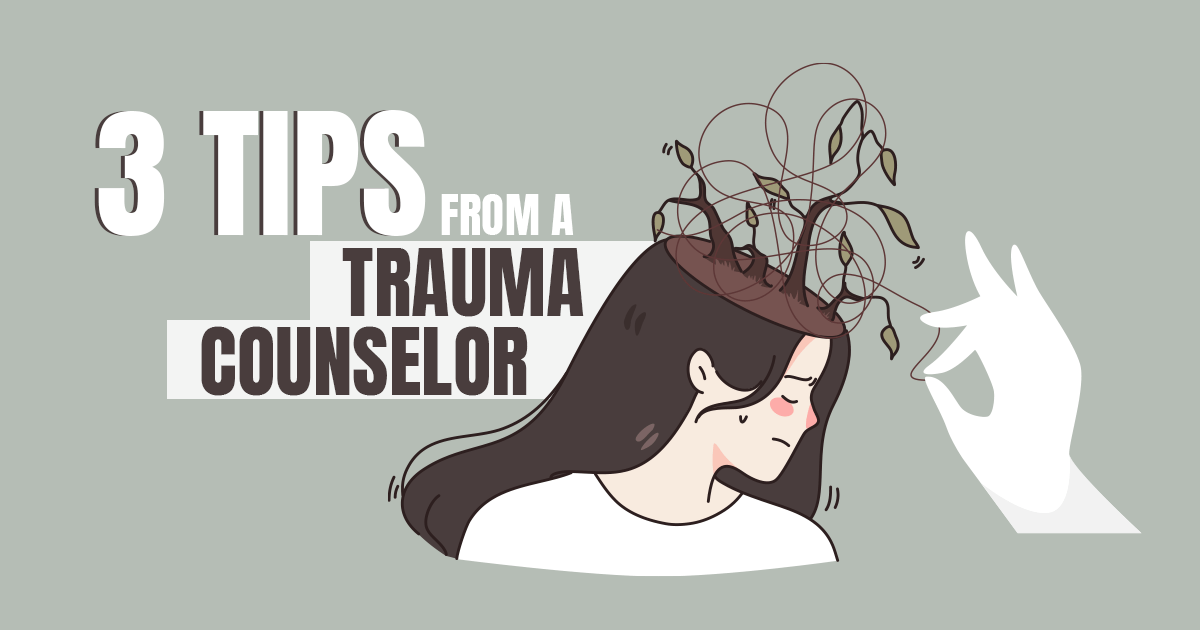Trauma counseling is a particular type of therapy that helps you deal with the emotional and psychological responses you may experience due to a traumatic event. If you’re in such a situation, a trauma counselor might help.
Most people experience some form of a traumatic event in their life. Traumatic events can be wide-ranging.
According to the Mental Health Services Administration, they may include sexual abuse or violence, rape, physical abuse or domestic violence, terrorist attacks, ongoing abuse or neglect, bullying, or a natural disaster.
Below, we discuss working with a mental health professional specializing in trauma survivors and what therapists want you to know.
Understanding Traumatic Experiences
Trauma is a psychological, emotional response you may have to a traumatic event. Traumatic events are disturbing or create immense distress. In many cases, someone experiencing something traumatic will fear for their life.
Along with a single experience, trauma responses can also develop from ongoing events, like growing up in a home with abuse.
Everyone has different reactions to trauma. While most people will experience something that could be considered acute psychological trauma, some people will have “normal reactions” and move past the situation, but others won’t.
There are subtypes that some therapists may use as they plan for the treatment of trauma.
- One of the types of trauma is complex, which happens on a repeated basis and may lead to direct harm. Complex trauma is cumulative and often occurs within a particular setting or relationship.
- Post-traumatic stress disorder (PTSD) develops after someone experiences something deeply terrifying or disturbing where they might have gone through physical harm or the threat of harm. Someone with PTSD will have persistent stress and trauma symptoms well after the event ends.
- There’s also developmental trauma disorder, which researchers believe forms in the first three years of a child’s life. This developmental issue could occur because of neglect or abuse or other similar adverse childhood experiences. It could impact a child’s psychological, cognitive, and neurological function as a developmental problem.
Trauma Counseling
Counseling for a traumatic experience is the best way to begin to heal. There are different types of helpful therapy in these situations, including:
- Prolonged exposure therapy (PE): In this type of therapy, you work with a therapist who will expose you to the source of your fear. The goal is to get to a point where you eventually aren’t afraid anymore, and you can shift your behavioral pattern through exposure.
- Cognitive processing therapy (CPT): As part of CPT, you work with a trauma counselor to challenge what you perceive to have occurred and the thoughts, emotional reactions, and beliefs you’ve developed since then. CPT can happen in an individual or group setting.
- Trauma-focused cognitive behavioral therapy: This type of therapy is primarily for children and adolescents but can also be for adults. In TFCBT, you address beliefs you hold that aren’t accurate and lead to unhealthy patterns in behavior.
- Eye movement desensitization and reprocessing (EMDR): This compelling form of trauma counseling uses left-right rhythmic stimulation to release emotions otherwise blocked by difficult experiences such as emotional abuse or child abuse. There are a set number of counseling sessions to deal with traumatic memories during EMDR.
Most types of counseling for exposure to traumatic situations or events have a definitive start and endpoint. Usually, the treatments can be complete within around three to four months.
3 Tips From a Trauma Counselor
The following are some of the main things mental health counselors want you to know with those things in mind.
1. Find Someone Who Specializes in Counseling for Traumatic Events
Dealing with traumatic events and exposure is something that can require complex treatment. The treatment provider needs to understand how to treat patients in particular ways. A real trauma therapist isn’t just anyone who works with patients who experience trauma.
Crisis counselors want you to know that it’s a very specialized area of psychology. You need to work with someone who’s both trained and experienced.
Trauma-informed therapy doesn’t simply mean the therapist has worked with previous patients who have a traumatic experience in their background.
The treatment process requires problem-solving skills, and it’s similar to going to a specialist for a physical health condition instead of hoping your general practitioner can treat it.
Therapists should have training, supervision, and clinical experience directly working on the effects of trauma and the symptoms of trauma.
A therapist trained to treat people with traumatic life experiences may work in a treatment facility or private practice. Social workers may also have relevant training and experience.
2. You Can Change Your Quality of Life with Therapy
Regardless of where you are in your journey, one of the best things you can do is get therapy. Too often, we see people who wait or think it won’t help them. The reality is therapy is the best way to get your symptoms under control and feel better in all aspects of your everyday life.
Some of the benefits of working with a therapist as you deal with the impact of trauma include:
- You can reduce your feelings of fear and avoidance. Experiencing something traumatic can cause you to avoid certain people, places, or things that remind you of it. That impacts your functionality. When you work with a therapist, you can confront your scary or negative memories so you can overcome your fear and then get past potential blocks or obstacles in your life.
- Working with a specially trained therapist can help you improve your coping skills for difficult or stressful events that are inevitable in life. PTSD and issues related to trauma are also continued through problematic beliefs. When you go through therapy, you learn the coping skills and the sense of confidence you need in your daily life.
- When you’ve had something traumatic happen to you, you may never feel truly safe. That can make it hard for you to trust other people. With therapy, you can learn how to move forward and build trusting relationships with others.
- You challenge your problematic beliefs and behavior patterns as you go through therapy. You might have relied on these harmful patterns to make sense of what happened, but you don’t have to do that.
- If you’ve ever felt invalidated in your feelings or experiences during a therapy session, it can help you realize these are, in fact, valid. You can begin to accept and heal what’s gone on.
- If you experience physical trauma-related symptoms, such as pain or migraines, therapy can help you with those as well.
3. Without Treatment, Complications Can Occur
If you’re dealing with a physical health condition and don’t receive proper treatment, it can lead to complications. For example, untreated or uncontrolled type 2 diabetes can lead to kidney damage and a wide variety of other complications.
The same is true with mental health.
The longer you go without getting treatment for a mental health condition from a certified trauma counselor, the more likely it is that a wide range of complications can occur.
Complications may include developing other mental health issues such as depression or anxiety. Substance abuse, addiction, or suicidal thoughts or behaviors can also be complications of untreated mental health disorders.
When you have co-occurring disorders, it becomes more challenging to treat. The sooner you get behavioral health services, the better.
Counseling for Traumatic Events
Your trauma is real and impacts perhaps every part of your life. At the same time, treatment can and will help when you work with someone qualified. Please, contact us to learn more about working with a trauma counselor so that you can see the trajectory of your life change as a result.
You can get unstuck from what’s holding you back, but only with proper treatment. If you or someone you love is having difficulty coping with a traumatic event, call Story Wellness at (866) 476-2823 to learn more about ways to heal.





